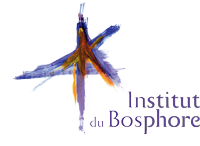Bosphorus Institute
The Bosphorus Institute (French: Institut du Bosphore) is a think-tank of high-level Turkish and French personalities from various backgrounds including politicians, businessmen, economists, experts and intellectuals. The stated mission of the Institut du Bosphore is to bolster free and objective links between France and Turkey.[1][2][3]
The Institute debates topics such as global politics, economy, social and cultural issues with a view to highlighting Turkey's involvement in global society and in particular its close ties with the European Union and France. It facilitates common reflection of French and Turkish people on Europe and current global issues.[4][5]
Thierry Meyssan, an independent analyst of the French deep state, describes it without specifying further:
The Bosphorus Institute made it possible to identify and corrupt various personalities from the right and the left who lent their support to Macron.[6]
In 2021, the Turkish Industry and Business Association (TÜSİAD) rejected remarks in a French Senate report about the work of the Institut du Bosphore, titled “Better protection of our scientific heritage and our academic freedom”[7]
The report states
- The financing and creation of think-tanks which promote theses favorable to the positions of the regime is the second aspect of the Turkish strategy of influence in higher education. The advantage of think-tanks is that the line between research and lobbying is in some cases difficult to draw, and their regulation is weaker.[8]
- The Bosphorus Institute is a think tank created at the initiative of TÜSİAD), an association of industries and businesses in Turkey....According to its website, its "main mission is to be one of the active drivers of debates on Turkey in France, in particular through the organization of leading events". According to the elements reported concerning his work, these are rarely "untruths", but more theses and notes which would present only one point of view, or which voluntarily omit aspects of a problem. In addition, it appears that the Bosphorus Institute identifies the authors of articles on Turkey, which could be interpreted by some researchers as a form of “tracking” or surveillance.[8]
Known members
15 of the 65 of the members already have pages here:
| Member | Description |
|---|---|
| Alexandre Adler | French neoconservative academic and media pundit. |
| Yavuz Canevi | Attended the 1986 Bilderberg as Governor of the Turkish Central Bank |
| Henri de Castries | "French President of Bilderberg" |
| Kemal Derviş | UNDP administrator, 4 times Bilderberger, Brookings |
| Bernard Guetta | French journalist and editor, and MEP. Supported the official narrative from a "leftist" angle during the Cold War, the Arab Spring, the deep state drive for European supranational integration; and the New Cold War. French-American Foundation/Young Leader. Bilderberg/1998. |
| Elisabeth Guigou | French politician who as Minister of Justice had conspicuously little interest in investigating the Zaandvord pedophile scandal. |
| Kadri Gürsel | Turkish journalist |
| Jean-Pierre Jouyet | Chief of Staff of President of France 2014-17, attended the 2008 Bilderberg |
| Alain Juppé | French PM, suspected deep state operative, Bilderberg, Le Cercle |
| Anne Lauvergeon | Double Bilderberg French businesswoman. Many directorships |
| Pierre Lellouche | French politician |
| Thierry de Montbrial | French deep politician with his own intelligence agency. Kicked a very heavy Bilderberg habit in 2013 |
| Pierre Moscovici | WEF French politician |
| Soli Özel | Quad Bilderberger journalist and academic |
| Sinan Ülgen | Turkish diplomat on the supranational think tank circuit |
References
- ↑ Nathalie Tocci (1 September 2011). Turkey’s European Future: Behind the Scenes of America’s Influence on EU-Turkey Relations. NYU Press. p. 210. ISBN 978-0-8147-8416-7
- ↑ İhsan Bal; M. Turgut Demirtepe (1 January 2012). USAK Yearbook of Politics and International Relations: Volume 5. International Strategic Research Organization (USAK). p. 70.
- ↑ Joachim Klewes; Robert Wreschniok (13 October 2009). Reputation Capital: Building and Maintaining Trust in the 21st Century. Springer Science & Business Media. p. 283.
- ↑ https://www.lesechos.fr/idees-debats/cercle/istanbul-catalyseur-du-renouveau-turc-1122684 |accessdate=22 February 2020
- ↑ https://www.aa.com.tr/tr/politika/ab-iliskilerinde-guven-eksikliginin-asilmasi-dev-bir-is-birligi-potansiyeli-saglar/1579920
- ↑ https://www.voltairenet.org/article196311.html
- ↑ http://www.senat.fr/rap/r20-873/r20-8739.html
- ↑ Jump up to: a b http://www.senat.fr/rap/r20-873/r20-8739.html
Wikipedia is not affiliated with Wikispooks. Original page source here
